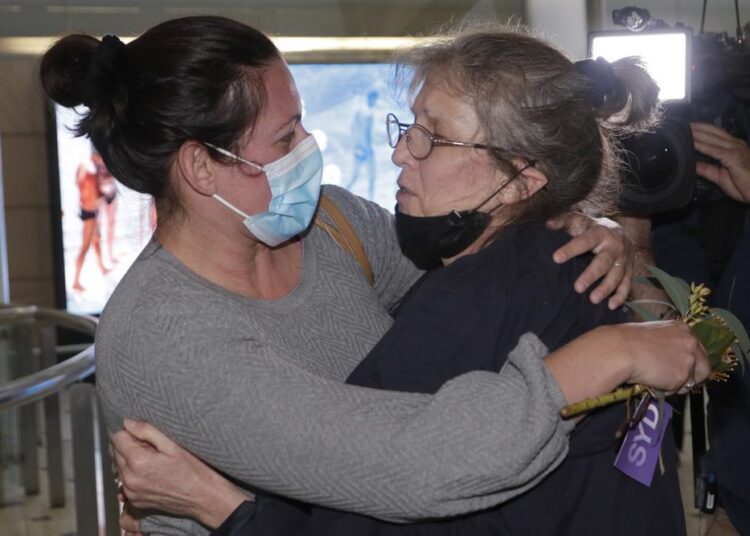CANBERRA, Australia — Sydney’s international airport came alive with tears, embraces and laughter on Monday as Australia opened its border for the first time in 20 months, with some arriving travellers removing mandatory masks to see the faces of loved ones they’ve been separated from for so long, according to AP.
“Just being able to come home without having to go to quarantine is huge,” Carly Boyd, a passenger who travelled from New York, told reporters at Sydney’s Kingsford-Smith Airport, where Peter Allen’s unofficial national anthem “I Still Call Australia Home” was playing.
“There’s a lot of people on that flight who have loved ones who are about to die or have people who died this week. So for them to be able to get off the plane and go see them straight away is pretty amazing,” Boyd added.
Countries in the Asia-Pacific have had some of the world’s strictest Covid-19 pandemic lockdown measures and travel restrictions, but with vaccination rates rising and cases falling, many are now starting to cautiously reopen.
Some, like China and Japan, remain essentially sealed-off to foreign visitors but Thailand also started to substantially reopen Monday and many others have also already started, or plan to follow suit.
Tourism accounted for some 20 per cent of Thailand’s economy before the pandemic, and the lockdown has caused massive job losses and hardship.
Still, only a few months removed from a surge fueled by the delta variant of the virus that saw deaths rise dramatically, many Thais remain worried that an influx of outsiders could trigger new outbreaks.
Bangkok taxi driver Issarapong Paingam lost his mother to Covid-19 during the recent surge, and said it would make more sense to him for the government to focus its attention fully on reopening domestically before introducing foreign travellers into the mix.
“The government has not yet told the public what they would do if an outbreak takes place again,” the 34-year-old said. “I don’t understand why they don’t let people in the country live normally as a trial to see the trend (of Covid-19 cases) before welcoming tourists.”
Thailand has allowed residents to travel during the pandemic, but mandated a strict two-week quarantine in specially designated hotels for people entering the country.
Foreign arrivals plummeted from 40 million in 2019 to 6.69 million in 2020 — almost all in the first three months before the pandemic restrictions were introduced — to fewer than 100,000 so far in 2021.
Monday’s reopening builds on a pilot scheme launched in July on the resort island of Phuket, which allowed fully vaccinated travellers from selected countries to spend their quarantine moving around the island instead of in a hotel room.
Starting Monday, if travellers are fully vaccinated and from one of 46 “low risk” countries, they are exempt from quarantine. They need to spend one night at a designated hotel and can’t check out until they have a negative Covid-19 test, but then are free to travel.
Travellers from countries not on the preferred list or those who are unvaccinated are still subject to various quarantine rules.
Restrictions are also being relaxed in the destination areas, including widespread reopening of businesses and other facilities such as department stores, spas, tattoo shops, schools and sporting events.
With the combination of strict screening of visitors and higher vaccination rates in Thailand, Supat Hasuwannakit, president of Thailand’s Rural Doctor Society, said he is not concerned about foreign tourists sparking a new surge in cases.
But he said he does worry about the planned reopening of bars and clubs in December, noting that recent domestic outbreaks came after the government allowed people to gather for activities such as religious services and weddings.
“Once people start to gather, eat and drink, it has a high possibility to create a new outbreak,” he said. “Most bars and nightclubs are indoors with bad airflow, so it is easy for Covid-19 to spread once they reopen.”
Rules requiring masks and distancing remain in place, much like other countries in the region that have begun reopening.
In India, which saw a peak of 400,000 daily cases in April and May, officials have been warning that people need to continue following such restrictions to avoid causing “super spreader” events during the holiday season as the country gradually reopens.
India began granting tourist visas on October 15 for fully vaccinated people arriving on charter flights, and will extend them to tourists on commercial flights starting November 15.
Neighbouring Sri Lanka has already started to allow fully vaccinated travelers without quarantines, and partially or non-vaccinated people with some restrictions. South Korea, which on Monday began to allow larger social gatherings and lifted operating-hour restrictions on restaurants, has a similar scheme.
Vietnam is still closed but plans to open the popular resort island of Phu Quoc to fully vaccinated vacationers by the end of the month, and neighbouring Cambodia, which on Monday lifted restrictions on domestic travel, has a similar plan to open two seaside provinces to international travelers. Malaysia intends to open its northern resort island of Langkawi on November 15 to fully vaccinated tourists.
Australia is betting that vaccination rates are now high enough to mitigate the danger of allowing international travel.






Discussion about this post